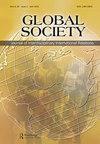定位于南方:重新解读巴西和中国与非洲的关系
IF 2.3
Q2 INTERNATIONAL RELATIONS
引用次数: 1
摘要
本文揭示了巴西和中国在国际定位中长期存在的错综复杂和困境。它揭示了塑造巴西和中国在世界上的自我意识的复杂话语,在全球南方,尤其是在与非洲的关系中。它运用了“阈限性”的概念来强调在这些国家的国际事务中,构建南南关系和援引南方身份是如何模糊、不确定的——因此是阈限的——努力的。通过剖析他们对非洲的外交和企业叙事,我们的分析表明,尽管存在紧张和矛盾,巴西和中国的行动者如何创造性地利用这种限制来追求外交政策目标和经济项目。在这样做的过程中,文章强调了“南方”(和“西方”)等强大结构的浮动性和模糊性,以及它们之间的二元对立。最后讨论了阈限视角如何使我们理解国际关系中角色和身份的不固定和多面性。本文章由计算机程序翻译,如有差异,请以英文原文为准。
Liminally Positioned in the South: Reinterpreting Brazilian and Chinese Relations with Africa
ABSTRACT
This article brings to fore long-standing intricacies and dilemmas in Brazil’s and China’s international positioning. It reveals the complex discursive repertoires shaping the Brazilian and Chinese sense of Self in the world, in the Global South, and, more particularly, in relation to Africa. It engages with the concept of “liminality” to highlight how constructing South–South relationships and invoking Southern identities have been ambiguous, indeterminate—thus liminal—endeavors in these countries’ international affairs. By dissecting their diplomatic and corporate narratives towards Africa, our analysis demonstrates, notwithstanding tensions and contradictions, how Brazilian and Chinese actors have creatively acted upon this liminality to pursue foreign policy goals and economic projects. In doing so, the article stresses the floating, ambiguous nature of powerful constructs such as “South” (and “West”), and binary oppositions between them. It concludes by discussing how a liminality perspective allows us to understand the unfixed and multifaceted nature of roles and identities in international relations.
求助全文
通过发布文献求助,成功后即可免费获取论文全文。
去求助
来源期刊

Global Society
INTERNATIONAL RELATIONS-
CiteScore
3.10
自引率
6.20%
发文量
32
期刊介绍:
Global Society covers the new agenda in global and international relations and encourages innovative approaches to the study of global and international issues from a range of disciplines. It promotes the analysis of transactions at multiple levels, and in particular, the way in which these transactions blur the distinction between the sub-national, national, transnational, international and global levels. An ever integrating global society raises a number of issues for global and international relations which do not fit comfortably within established "Paradigms" Among these are the international and global consequences of nationalism and struggles for identity, migration, racism, religious fundamentalism, terrorism and criminal activities.
 求助内容:
求助内容: 应助结果提醒方式:
应助结果提醒方式:


